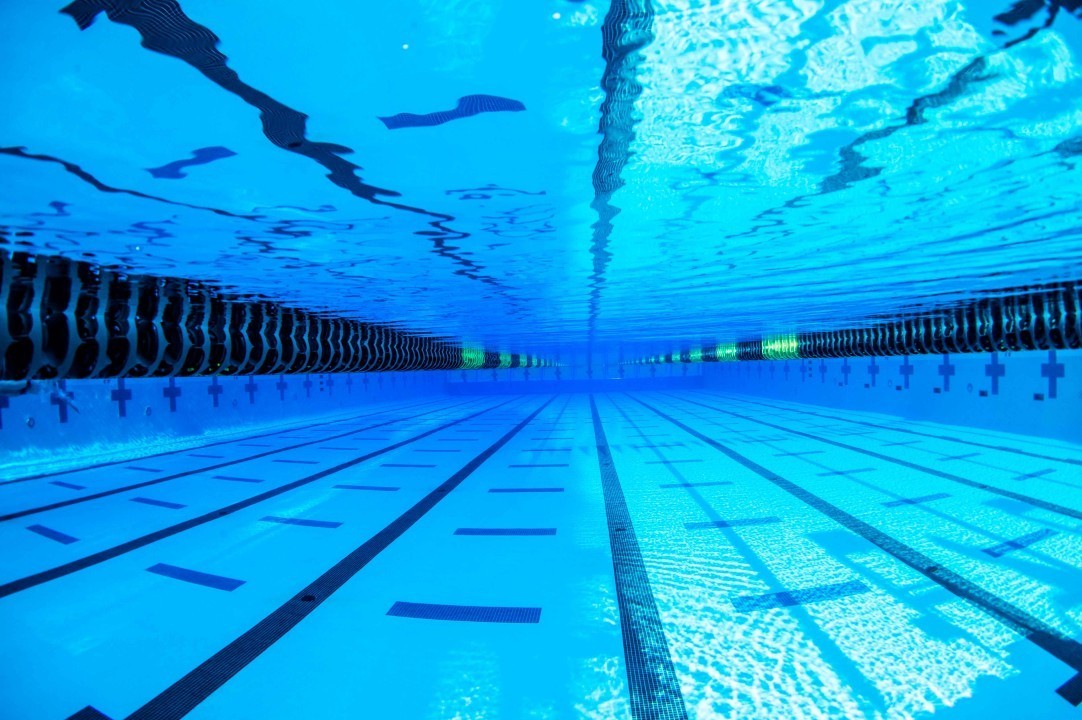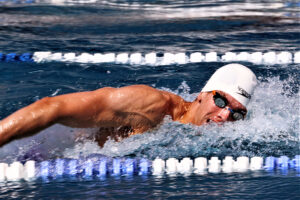Courtesy: Dr. David Manolo Sailer
Not gonna sugarcoat it. Times are rough – emotionally and mentally tough. In theory, commitment and effort are important, so is having a certain balance in life. But frankly, feeling like our lives’ plans, preparations and future time horizons are being robbed or taken away from us is perfectly normal. Therefore, please let me remind you of something that you’ve already accomplished, already conquered but might’ve forgotten in the midst of this pandemic turmoil: The Swimmer’s Advantage.
Excellence through monotony
In swimming, there are basically no visual distractions. The only reference point is a black line at the bottom of the pool that you constantly stare at. However, there is something else there: You – that is your mind, your focus, and thought processes.
Counting endless laps might just prove to be the most valuable and underappreciated asset that could make all the difference in today’s monotony. Any swimmer, no matter your current age or performance level, has proven the mastery of this skill. Lap after lap after lap – and still performing. Ever subtler, ever stronger. There’s excellence achievable through and thus lying within monotony.
While both peak performance and endurance do require mental strength, swimmers have an advantage: we’re not only able to persevere steadfastly, like every athlete; we do so in a precise and focused manner embedded within everlasting repetitiveness. It’s the same lane we swim in – mile after mile, kilometer after kilometer – by ourselves and for ourselves. Alone, but never lonely. Hence, the swimmer’s first advantage: excellence through monotony.
Handling fluidity – controlling the outcome
Fine, so we can handle and even excel through monotony. Nevertheless, times remain difficult. On second thought, we shouldn’t let outside events throw us off balance. After all, aren’t we swimmers supposed to be the ones out there “controlling our lane”?
Well, here’s the swimmer’s second advantage: our ability to handle an element of fluidity. Swimmers manage its transitory and fleeting nature. This means we’re capable of dealing with ambiguities and volatility, hence times of uncertainty – quite possibly like no other athlete. We’ve proven it over and over again in training, both physically and mentally. It’s in our DNA and nature to do so: to get a grip where no one else can; to exercise control in an environment without a solid foundation or stable ground to apply force against.
Even in difficult times, when life doesn’t go according to plan, the swimmer will be able to adapt, refocus quickly, and execute – just like in racing. Thus, no matter what these volatile times throw at you, they “find and shall find you unafraid” (W.E. Henley, Invictus). For whenever you step on those blocks, looking at the calm water and its reflections in front of you, the one in charge is always you. You’re the pilot and from here on out it’s your responsibility to control the outcome.
Working with resistance – not against it
For every peak performance, there’re some challenges. At the same time, resistance is all too often misinterpreted as a disturbance. A negative view is based on a misconception. Because contrary to popular belief, it’s quite possible to work with resistance – not against it. Every swimmer knows that.
In swimming, water resistance is not the enemy. We embrace it, work with it – hell, it even stabilizes us! One cannot negotiate with water. Swimmers actively work with drag in order for the element to support our strokes, kicks and that unique feel for the water. All our movements are directed towards utilization of resistance flows. So why would we work against them in life?
Resistance demands discipline. There’s a certain amount of intensity and suffering involved in discipline. That’s because the ability to suffer and the capacity to perform are two sides of the same coin. And sure, you can renounce discipline. But in doing so, you are merely opting for the alternative: regret. The point being: you’re gonna get hurt one way or another – either by the intensity of a strenuous lifestyle or due to the regret of not having tried at all.
How do we work with resistance in our professional and private life? First, expect it. Include it in any considerations or plans from the get-go. Do not pretend it’s not there, for it is. Then – by analogy – engage, just like in swimming. By embracing it, we start to manage our expectations: it is by working through and with resistance that we obtain a secure grip, which ensures stability in an aura of certainty. However, if we are to rely on discipline, practice will be vital. Discipline per se strives to overcome resistances and obstacles through a regime of drill and exercise. It’s a daring act of determination and conquest, especially in times of apparent stagnation, embodying the resilient conviction of one’s own enduring robustness and persistent resourcefulness.
What if?
In closing, just imagine a swimmer whose struggle has paid off. Who went through a series of conflicts and bounced back dropping time. Who, in the face of adversity and all the sacrifices made, accomplished his or her own goals. Picture that vividly – and then make that swimmer yourself!
The year-round training, embedded in routines and (numerous) daily swim practices for years, is a test of your inner self, a test of mental toughness and on how much you really want it. For the swimmer’s consistency of effort turns into a rhythm that flows with the element, a beat he or she lives by and a harmony that stems from it. By following the pattern, trusting the process and embracing the pulse of striving forward, we excel and move on to better things.
So, what if you became obsessed with resistance?
Wouldn’t that be a sight?
About Dr. David Manolo Sailer
David Sailer has been a competitive swimmer for the better part of the last 15 years – starting off at the age of 6 he learned swimming in a heated seawater pool at the French Riviera (Côte d’Azur). With the 2004 Olympic Games in Athens having a profound impact on the young man, he joined one of the then best swimming clubs nationwide. As nationally top ranked age grouper he specialized on the short-to-mid butterfly and freestyle distances – most notably the 100 and 200 fly as well as the 400 free, where he achieved ranks in the European-Top 100 (at Junior age group level) –, later becoming a multiple state and (youth) national champion in his home country of Austria. With the water never completely letting go of him, he graduated summa cum laude with a PhD at age 26. Today he conducts research on the philosophy of performance and publishes on various anthropological and philosophical subjects. His new book will be published in early 2022.

